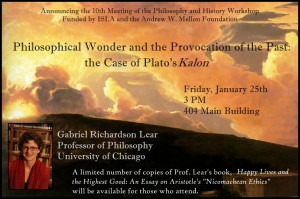Join us for a talk by Dan Sportiello (philosophy) on Friday, September 14th at 3:30 pm in 339 O’Shaughnessy, entitled “‘I Believe in Harvey Dent’: the Noble Lie, the Love of Fate, and the Practical Proof.”
Refreshments and conversation to follow.
Abstract:
As rational animals, we are born into original sin–that is, into desires and fears not of our own making. And yet, as rational animals, we seek to transcend those desires and fears–that is, to reorder them such that they will no longer destroy us. We do this through telling ourselves stories–that is, though changing how we see ourselves.
Such stories echo down the whole history of philosophy: to get men and women to die for one another, Plato’s Socrates suggests that one must tell them that, despite appearances, they were born from the same mother, the earth–just as Kant suggests that one must postulate that, despite appearances, we are free to act morally.
There are two ways to interpret such stories–what Plato’s Socrates calls Noble Lies.
The first is fairly obvious: they are lies. So Nietzsche interpreted Kant: though morality indeed requires practical postulates, such postulates are obviously false. To transcend our desires and fears thus requires us to fracture ourselves into theoretical and practical; better is the rejection of transcendence–what Nietzsche calls the Love of Fate.
But there is another way to interpret such stories: in believing them, we make their truth manifest. So Hegel interpreted Kant: inspired by our belief in our freedom, we can construct a society in which we are indeed free–that is, in which we see our transcendence of our desires as the deepest expression of those desires. In the face of such a construction–what Kant calls a Practical Proof–Nietzschean skepticism rings hollow. But until we achieve such a construction–until, that is, we actually build a society in which we are neither exploited nor manipulated–its plausibility remains suspect.
I intend not to arbitrate between the Love of Fate and the Practical Proof but rather to suggest the application of the distinction to the history of philosophy: just as the legacy of Kant was contested by Nietzsche and Hegel, I argue, the legacy of Socrates was contested by Diogenes and Plato. I will ask the audience to suggest and consider the plausibility of other examples of this distinction in action.


